

Whales 'stressed by ocean noise' 8 February 2012Last updated at 03:28 By Richard Black Environment correspondent, BBC News Right whales come to the Bay of Fundy late each summer to feed.
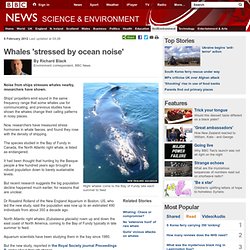
UV from sunlight excites nanoparticles to kill phytoplankton in lab setting. Microscopic bits of metal – nanoparticles, a thousand times smaller than the thickness of a human hair – have been touted as a biotechnology and manufacturing miracle.
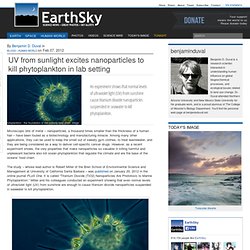
Among many other applications, they can be used to keep the smell out of sweaty gym clothes, to treat wastewater, and they are being considered as a way to deliver cell-specific cancer drugs. However, as a recent experiment shows, the very properties that make nanoparticles so valuable in killing harmful and unpleasant bacteria also kill ocean phytoplankton that regulate the climate and are the base of the oceans’ food chain. The study – whose lead author is Robert Miller of the Bren School of Environmental Science and Management at University of California Santa Barbara – was published on January 20, 2012 in the online journal PLoS One. Scientists look to sea to help prevent antibiotic resistance.
Scientists from the National Oceanic and Atmospheric Administration (NOAA) and their partners are looking to the sea for new medicines.
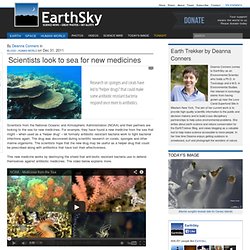
For example, they have found a new medicine from the sea that might – when used as a “helper drug” – let formally antibiotic resistant bacteria work to fight bacterial infections again. The drug was discovered during scientific research on corals, sponges and other marine organisms. The scientists hope that the new drug may be useful as a helper drug that could be prescribed along with antibiotics that have lost their effectiveness. This new medicine works by destroying the shield that anti-biotic resistant bacteria use to defend themselves against antibiotic medicines. More than one in 10 marine species in tropical eastern Pacific face extinction. The giant sea bass (Stereolepis gigas) - listed by conservationists as 'critically endangered' - was once common in the waters around southern California and the Gulf of California.
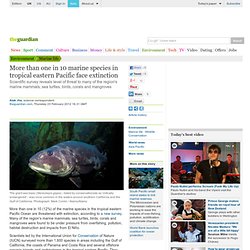
Photograph: Mark Conlin / Alamy/Alamy More than one in 10 (12%) of the marine species in the tropical eastern Pacific Ocean are threatened with extinction, according to a new survey. Many of the region's marine mammals, sea turtles, birds, corals and mangroves were found to be under pressure from overfishing, pollution, habitat destruction and impacts from El Niño. Scientists led by the International Union for Conservation of Nature (IUCN) surveyed more than 1,600 species in areas including the Gulf of California, the coasts of Panama and Costa Rica and several offshore oceanic islands and archipelagos in the tropical eastern Pacific. Oil from 2007 spill surprisingly toxic to fish, scientists report. Thick, tarry fuel oil disgorged into San Francisco Bay from a damaged cargo ship in 2007 was surprisingly toxic to fish embryos, devastating the herring population that feeds seabirds, whales and the bay's last commercial fishery, scientists reported Monday.
Although the bay's herring spawning grounds are now free of toxic oil, studies have found that the moderate-size spill of 54,000 gallons had an unexpectedly large and lethal effect. The culprit, a common type of ship fuel called "bunker fuel," appears to be especially toxic to fish embryos, particularly when exposed to sunlight, according to a study published Monday in the Proceedings of the National Academy of Sciences. "That's the big lesson," said John Incardona, a toxicologist with the National Marine Fisheries Service. Sharks More Prevalent In Protected Areas, Study Claims. March 10, 2012 Using data collected from over 200 baited remote underwater video (BRUV) cameras, scientists have discovered that Caribbean reef sharks are more abundant in marine reserves than in areas where fishing is allowed.
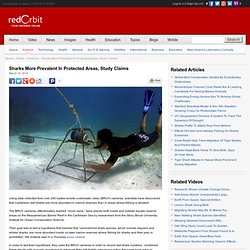
The BRUV cameras, affectionately dubbed “chum cams,” were placed both inside and outside aquatic reserve areas on the Mesoamerican Barrier Reef in the Caribbean Sea by researchers from the Stony Brook University Institute for Ocean Conservation Science. Their goal was to test a hypothesis that claimed that “carcharhinid shark species, which include requiem and whaler sharks, are more abundant inside no-take marine reserves where fishing for sharks and their prey is prohibited,” the Institute said in a Thursday press release. Catlin Seaview Survey to reveal Great Barrier Reef on Google Earth. Google Street View has revealed massive cities, rural villages, mountain ranges, the Swiss Alps railway, the Amazon river and The National Gallery in London.
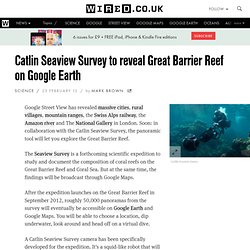
CO2 Driving Biggest Ocean Chemistry Changes In 300M Years? March 06, 2012.
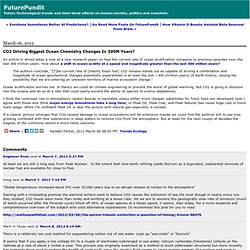
Ecosystem service tradeoff analysis reveals the value of marine spatial planning for multiple ocean uses. Appetite for shark fin soup 'causing decline of blue sharks in UK waters' Skippers and firm fined almost £1m for part in £63m 'black fish' scam. 24 February 2012Last updated at 15:26 Seventeen skippers who operated an industrial scale fishing fraud have been fined £720,000 in total.
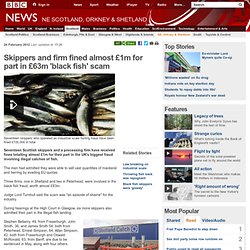
Securing WA's Marine Futures project (2006-2008) > Centre for Marine Futures: The University of Western Australia. Funding The project was funded from 2006-2008 by the Natural Heritage Trust. Partners WA Government agencies Australian government The Marine Futures Project, which was completed from January 2006 to December 2008, developed a number of outputs which will support natural resource management into the future.
BBC Nature - Corals inflate to escape being buried alive in sand. 8 February 2012Last updated at 03:38 By Victoria Gill Science reporter, BBC Nature Footage captured over 20 hours shows the coral inflating and deflating to throw off sand.
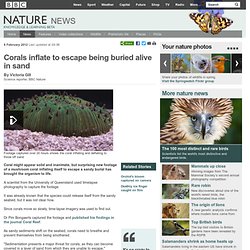
Enventi to investigate cost benefits of ‘floating wind’ technology. Green innovation news – by Beth Glanvill 1st November 2011 A new study has been launched to examine whether floating wind turbine structures can help meet Government targets to reduce the cost of offshore wind.

Engineering and consultancy firm Enventi said it had gathered a range of industry professionals within the offshore wind industry to carry out a comprehensive study to reveal how 'floating wind' technologies are cost effective as well as technically sound. Overfishing 'costs EU £2.7bn each year' 10 February 2012Last updated at 09:41 ET By Mark Kinver Environment reporter, BBC News. A balanced kettle of fish – IUCN suggests a novel approach to fishing. 01 March 2012 | News story An IUCN study published in the journal Science suggests major rethinking of fisheries management that could increase food security and minimize the negative impacts of fishing on the environment. Plans to ban fishing discards threatened by EU member states. A group of European Union member states are planning to thwart key reforms aimed at conserving dwindling fish stocks.
Photograph: Jeff J Mitchell/Getty images. Would an EU ban on fish discards be effective? Horse mussels fine from Europe could be £8m. 15 March 2012Last updated at 13:44 ET By Mike McKimm BBC NI environment correspondent. Whales 'stressed by ocean noise' Isle of Man scallop fishers test the waters at marine reserve. Biofuel from beneath the waves.